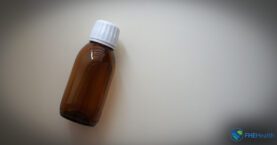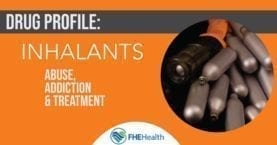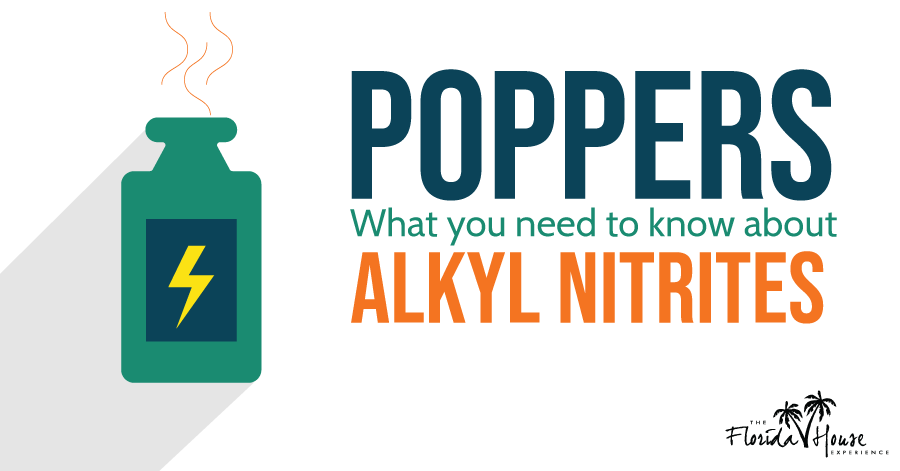
(This article was updated on December 18, 2024 and contains information from our previous blog on poppers)
What Are Poppers?
The word ‘poppers’ is a slang term used to describe a type of chemical that is often inhaled as a recreational drug. Also known as “alkyl nitrites,” “butyl nitrate,” “isobutyl nitrite,” and “isopropyl nitrite,” these liquids come packaged in small bottles. Users remove the bottle cap and inhale the fumes from the chemicals, which often leads to a brief, intense “high” that can include feelings ranging from intoxication to intense relaxation, dizziness, and euphoria.
Poppers provide short-term side effects that can last anywhere from just a few seconds up to a couple of minutes, which is why popper users often take multiple “hits” over the course of an evening.
What Were Poppers First Used For?
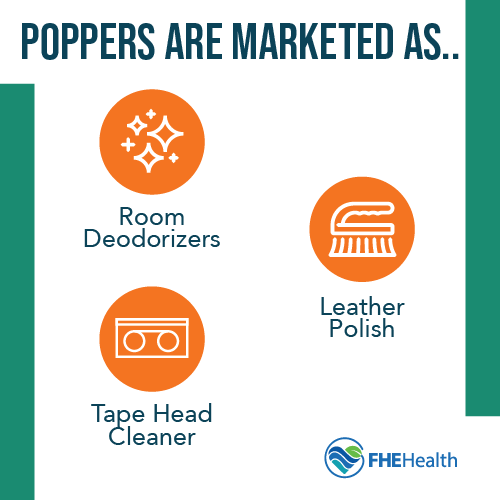
Once safer, more effective alternatives such as nitro-glycerine were developed during the 1960s, medical use of alkyl nitrites decreased— although they continue to be used to treat cyanide poisoning in some countries.
There were also reports of poppers being provided to soldiers in the Vietnam War to help counteract the negative effects of inhaling gun fumes, and short-term inhalants continue to be used in combat situations worldwide.
By the late 1960s, poppers were no longer available over the counter in the United States. However, drug companies quickly rebranded chemicals such as isobutyl nitrite and isopropyl nitrite as room deodorizers. Once again, poppers were widely available in corner stores and head shops throughout the country, and they continue to be sold in retail outlets today. They’ve even occasionally shown up in pop-culture. In the popular and irreverent FX show, “It’s Always Sunny in Philadelphia,” Season 4, Episode “Mac and Charlie Die,” they make a reference to poppers and use them to “bring Charlie back” after he suffers a concussion. (It should be noted that this is, of course, a horrible misuse of the substance.) The drug was also referenced in the sequel to “Silence of the Lambs, Hannibal.”
Do Only LGBTQ People Use Poppers?
Poppers such as alkyl nitrites, isobutyl nitrite, and isopropyl nitrite have long been used within the gay community and inhalants were widely associated with the gay nightclub scene throughout the 70s, 80s, and 90s.
The sudden drop in blood pressure that these inhalants can cause may leave users feeling temporarily light-headed and even euphoric, while the loosening of smooth muscles throughout the body can make engaging in sexual activity more comfortable. Some experts believe that popper use among gay men contributed to the AIDS crisis, although this has never been confirmed.
Substances like these continue to be widely used among LGBTQ people who use drugs, although it’s wrong to categorize poppers as “gay drugs.” A recent survey found “the use of poppers to be 25 times more common among gay than straight men;” however, the stigma associating popper use with gay culture may mean that heterosexual men may be reluctant to disclose their popper use.
What Are the Physiological Effects of Isopropyl Nitrate?
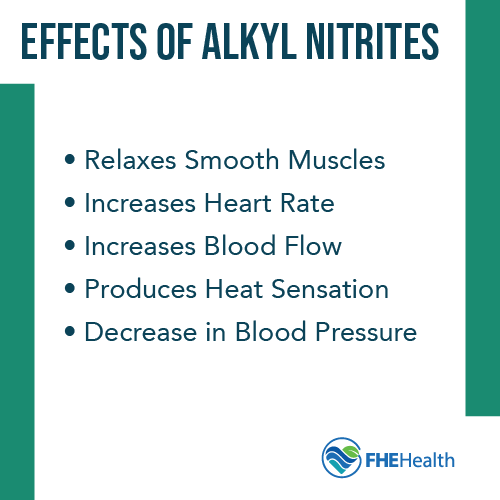
Poppers can temporarily relax involuntary muscles throughout the body while causing the heart rate to speed up at the same time due to increased blood flow. Poppers work very quickly, producing an almost instant high or “rush” of warm sensations and feelings of dizziness, similar to sensations of extreme alcohol intoxication. The effects come on very quickly after inhaling the drug, but unlike drugs such as alcohol, only last for seconds or minutes. While some people find the effects of poppers pleasurable, others find them extremely disorienting and unpleasant.
As vasodilators that dilate the blood vessels, poppers cause blood pressure to drop rapidly, leading to lightheadedness that can result in a brief loss of consciousness and muscle strength, known as “syncope.” At the same time, the heart speeds up— even if a user is relaxed. This effect is known as “tachycardia.”
Another effect of these drugs is the relaxation of the anal sphincter. For this reason, poppers are sometimes used to facilitate anal sex. In addition, some users find that using poppers during sex increases sexual sensations and intensifies orgasm.
Can You Overdose On Poppers?
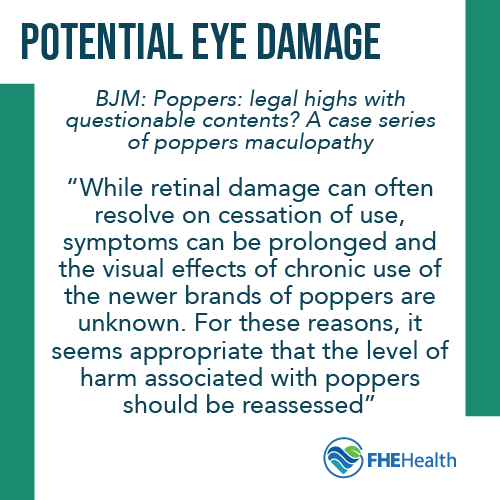
What Are Poppers’ Risks?
There is also a study published in the British Journal of Ophthalmology, suggesting that popper use can lead to permanent retinal damage. Researchers analyzed 12 men who were treated for vision problems at the Sussex Eye Hospital—all had recently used poppers containing isopropyl nitrate—although the study authors were unable to determine why isopropyl nitrite poppers seemed to be more toxic to the eyes than isobutyl nitrite-based poppers.
Other reported risks associated with popper use include chemical burns around the nose, mouth, and eyes. Popper use can also be dangerous for people who have pre-existing heart conditions that can include an irregular heartbeat or low blood pressure, and there can be added risks for people with glaucoma or anemia. When mixed with other drugs that can impact blood pressure, including alcohol, users are at an increased risk of suffering from a heart attack or stroke.
The practice of dipping cigarettes into psychoactive materials is fairly common in some circles, perhaps most commonly with PCP. This is done with poppers sometimes, but without lighting the cigarette. Due to the flammability of akyl nitrites, this is an extremely dangerous practice for reasons beyond the drug’s effect.
Worried About The Impact Poppers Have In Your Life?
Whether you’ve been using alkyl nitrites yourself or you are concerned about a loved one who sniffs poppers, it’s important to have a team of substance abuse specialists in your corner. Here at FHE Health, we offer the best science-based drug and alcohol addiction treatment using a combination of innovative brain therapies, psychological care, and ongoing support.
Don’t let poppers take over your life. Contact us anytime by calling us at (855)441-2449. We’re here 24 hours a day, 7 days a week to empower you and your loved ones.
